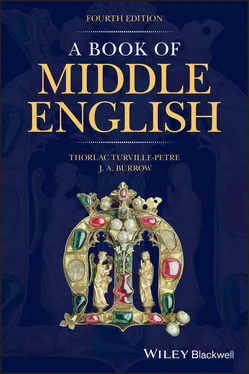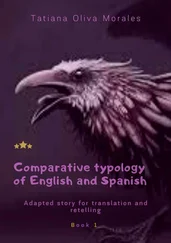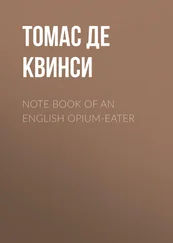A few common verbs historically classed as weak not only add ‐t ( e ) in the past tense but also modify the stem itself. Most have survived into Modern English. Examples taken from the Gawain poems are:
| infinitive |
pa. and pp . |
| bryng, ‘bring’ |
broʒt |
| seche, ‘seek’ |
soʒt |
| þenk, ‘think’ |
þoʒt |
| þynk, ‘seem’ |
þuʒt |
| worch, ‘work’ |
wroʒt |
4.5.5 The Verbs ‘Have’ and ‘Say’
Two very common weak verbs show a great variety of dialectal forms. They are habben/haven , ‘have’, and seggen/sayen , ‘say’. Here for comparison are the forms in the language of the Ancrene Wisse and Gawain :
|
|
Anc. W . |
Gawain |
Anc. W . |
Gawain |
| infin . |
|
habben |
have |
seggen |
say |
| pres. indic . |
| sg . |
1 |
habbe |
haf, have |
segge |
saye |
|
2 |
havest |
habbes, hatz |
seist |
seggez, says |
|
3 |
haveð |
habbes, hatz |
seið |
says, sayez |
| pl . |
habbeð |
haf, haven, han, hatz |
seggeð |
sayn |
| imp. sg . |
have |
haf |
sei |
say |
| past indic . |
| sg . |
1 |
hefde |
had(e) |
seide |
sayd(e) |
|
2 |
hefdest |
hadez |
seidest |
– |
|
3 |
hefde |
had(e) |
seide |
sayd(e) |
| pl . |
hefden |
hade(n) |
seiden |
sayden |
| past ppl . |
ihaved, ‐et |
hade |
iseid |
sayd |
4.5.6 Past of Strong Verbs
Strong verbs form their past tense by changing the stem vowel. In early texts a verb may exhibit as many as four different stem vowels: one in the infinitive and present tense, a second in the first and third persons singular of the past tense indicative, a third in the other forms of the past tense, and a fourth in the past participle. For example, in the language of the Ancrene Wisse , scheoten , ‘to shoot’:
| infin . |
pa. 1 & 3 sg . |
pa. pl . |
pp . |
| scheoten |
scheat |
schuten |
ischoten |
Gradually the two vowels of the past tense were reduced to one, sometimes settling on the stem vowel of the singular, sometimes on that of the plural; but this took place quite unsystematically, leaving doublet forms even in the same text: e.g. in Gawain there are the past tense plural forms ran and runnen . (Compare sunk and sank as alternative past tense forms in Modern English.)
The past tense of driven , ‘to drive’, in the language of the Ancrene Wisse :
| indicative |
| sg . |
1 |
ich |
draf |
|
2 |
þu |
drive |
|
3 |
he |
draf |
| pl . |
we, ʒe, ha |
driven |
| subjunctive |
| sg . |
ich, þu, he |
drive |
| pl . |
we, ʒe, ha |
driven |
| past participle |
|
idriven |
Note that in the indicative the forms of the first and third persons singular are identical, and the form of the plural is that of the second person singular with the addition of ‐n . In the subjunctive the singular and plural forms are the same as the second person singular and the plural of the indicative respectively. These observations apply to all regular strong verbs.
In the same ‘class’ as driven – that is to say, with the same series of vowel changes – are riden , writen , biden , ‘to wait’, risen and others. In this class, the vowel of the infinitive stem is long, /i:/, while the vowel of the past tense plural and past participle is short, /i/; compare Modern English drive– driven , ride–ridden , etc.
In Old English seven classes of strong verbs may be distinguished. During the Middle English period these began to be affected by so many dialectal changes and alterations by analogy with other verbs that it is no longer helpful to classify strong verbs in this way. Forms in the texts in this book may be followed up in the Glossary, and for a fuller display the Oxford English Dictionary and the Middle English Dictionary may be consulted.
Forms of the past tense were progressively simplified, first in Northern texts, so that in the language of the Gawain manuscript the past tense often has the same form throughout the singular and plural, indicative and subjunctive. Thus drof is both the singular and the plural form of ‘drove’, as in stremes … drof hem , 8/234–5; whereas in Chaucer’s Prioress’s Tale the past tense plural form of risen , a verb in the same class, is they ryse , ‘they rose’, 18b/227.
The past participle of strong verbs retained its ‐en longest in the North, but the ending was earlier lost in the South and in the Midlands. In Sir Orfeo are the forms ynome , ‘taken’ (from nimen ), 5/182, ycore , ‘chosen’, hence ‘excellent’ (from chesen ), 5/105, and ydrawe , ‘drawn’, 5/295; but also yborn (from beren ), 5/174, and both totore and totorn , ‘torn apart’, 5/171–3. Gower has write , ‘written’, 13/60, and ʒove , ‘given’, 13/127, together with spoken in the same line, while the Gawain manuscript usually keeps the ‐en , as in nomen , 8/360, bounden , 9/192. From such variants arise modern doublets such as the alternative British and American forms got and gotten .
So‐called ‘Preterite‐Present’ verbs have a present tense that was in origin a past tense, and have formed a new past tense. The commonest are cunnen , ‘to know how to’ (modern ‘can’), mahen , ‘to be able, have the ability, may’, moten , ‘to be allowed to, compelled to’ (its past tense gives modern ‘must’), schulen , ‘to have to, shall’, and witen , ‘to know’. In the language of the Ancrene Wisse they have these forms:
| present indicative |
| sg . |
1 |
can |
mei |
mot |
schal |
wat |
|
2 |
canst |
maht |
most |
schalt |
wast |
|
3 |
can |
mei |
mot |
schal |
wat |
| pl . |
cunnen |
mahen |
moten |
schule(n) |
witen |
| subjunctive |
| sg . |
cunne |
mahe |
mote |
schule |
wite |
| past indicative |
| sg . |
1, 3 |
cuðe |
mahte |
moste |
schulde |
wiste |
| (conjugation continues as for weak verbs: 4.5.4) |
The verb willen , ‘to want, wish, will’, has the following forms in the language of the Ancrene Wisse and Gawain :
Читать дальше












